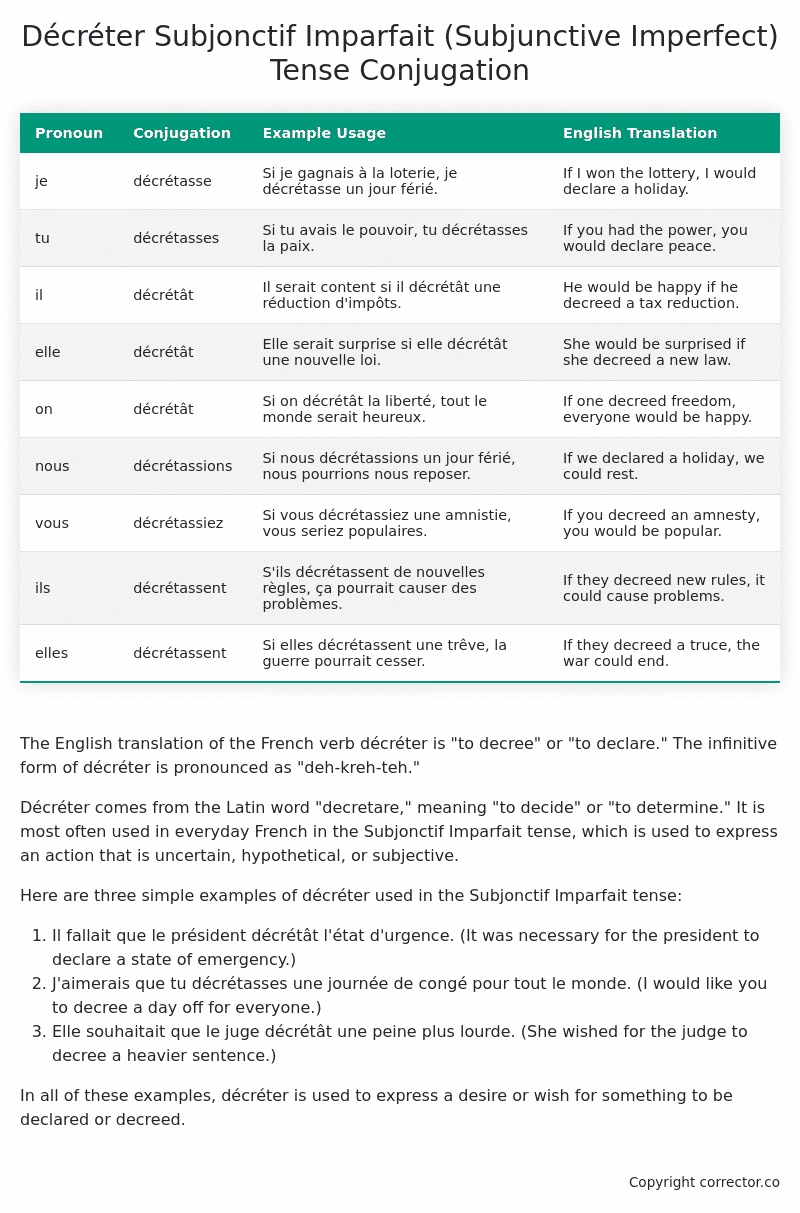Subjonctif Imparfait (Subjunctive Imperfect) Tense Conjugation of the French Verb décréter
Introduction to the verb décréter
The English translation of the French verb décréter is “to decree” or “to declare.” The infinitive form of décréter is pronounced as “deh-kreh-teh.”
Décréter comes from the Latin word “decretare,” meaning “to decide” or “to determine.” It is most often used in everyday French in the Subjonctif Imparfait tense, which is used to express an action that is uncertain, hypothetical, or subjective.
Here are three simple examples of décréter used in the Subjonctif Imparfait tense:
- Il fallait que le président décrétât l’état d’urgence. (It was necessary for the president to declare a state of emergency.)
- J’aimerais que tu décrétasses une journée de congé pour tout le monde. (I would like you to decree a day off for everyone.)
- Elle souhaitait que le juge décrétât une peine plus lourde. (She wished for the judge to decree a heavier sentence.)
In all of these examples, décréter is used to express a desire or wish for something to be declared or decreed.
Table of the Subjonctif Imparfait (Subjunctive Imperfect) Tense Conjugation of décréter
| Pronoun | Conjugation | Example Usage | English Translation |
|---|---|---|---|
| je | décrétasse | Si je gagnais à la loterie, je décrétasse un jour férié. | If I won the lottery, I would declare a holiday. |
| tu | décrétasses | Si tu avais le pouvoir, tu décrétasses la paix. | If you had the power, you would declare peace. |
| il | décrétât | Il serait content si il décrétât une réduction d’impôts. | He would be happy if he decreed a tax reduction. |
| elle | décrétât | Elle serait surprise si elle décrétât une nouvelle loi. | She would be surprised if she decreed a new law. |
| on | décrétât | Si on décrétât la liberté, tout le monde serait heureux. | If one decreed freedom, everyone would be happy. |
| nous | décrétassions | Si nous décrétassions un jour férié, nous pourrions nous reposer. | If we declared a holiday, we could rest. |
| vous | décrétassiez | Si vous décrétassiez une amnistie, vous seriez populaires. | If you decreed an amnesty, you would be popular. |
| ils | décrétassent | S’ils décrétassent de nouvelles règles, ça pourrait causer des problèmes. | If they decreed new rules, it could cause problems. |
| elles | décrétassent | Si elles décrétassent une trêve, la guerre pourrait cesser. | If they decreed a truce, the war could end. |
Other Conjugations for Décréter.
Le Present (Present Tense) Conjugation of the French Verb décréter
Imparfait (Imperfect) Tense Conjugation of the French Verb décréter
Passé Simple (Simple Past) Tense Conjugation of the French Verb décréter
Passé Composé (Present Perfect) Tense Conjugation of the French Verb décréter
Futur Simple (Simple Future) Tense Conjugation of the French Verb décréter
Futur Proche (Near Future) Tense Conjugation of the French Verb décréter
Plus-que-parfait (Pluperfect) Tense Conjugation of the French Verb décréter
Passé Antérieur (Past Anterior) Tense Conjugation of the French Verb décréter
Futur Antérieur (Future Anterior) Tense Conjugation of the French Verb décréter
Subjonctif Présent (Subjunctive Present) Tense Conjugation of the French Verb décréter
Subjonctif Passé (Subjunctive Past) Tense Conjugation of the French Verb décréter
Subjonctif Imparfait (Subjunctive Imperfect) Tense Conjugation of the French Verb décréter (this article)
Subjonctif Plus-que-parfait (Subjunctive Pluperfect) Tense Conjugation of the French Verb décréter
Conditionnel Présent (Conditional Present) Tense Conjugation of the French Verb décréter
Conditionnel Passé (Conditional Past) Tense Conjugation of the French Verb décréter
L’impératif Présent (Imperative Present) Tense Conjugation of the French Verb décréter
L’infinitif Présent (Infinitive Present) Tense Conjugation of the French Verb décréter
Struggling with French verbs or the language in general? Why not use our free French Grammar Checker – no registration required!
Get a FREE Download Study Sheet of this Conjugation 🔥
Simply right click the image below, click “save image” and get your free reference for the décréter Subjonctif Imparfait tense conjugation!

Décréter – About the French Subjonctif Imparfait (Subjunctive Imperfect) Tense
Formation
Common Everyday Usage Patterns
Interactions with Other Tenses
Subjonctif Présent
Indicatif Passé Composé
Conditional
Conditional Perfect
Summary
I hope you enjoyed this article on the verb décréter. Still in a learning mood? Check out another TOTALLY random French verb conjugation!


